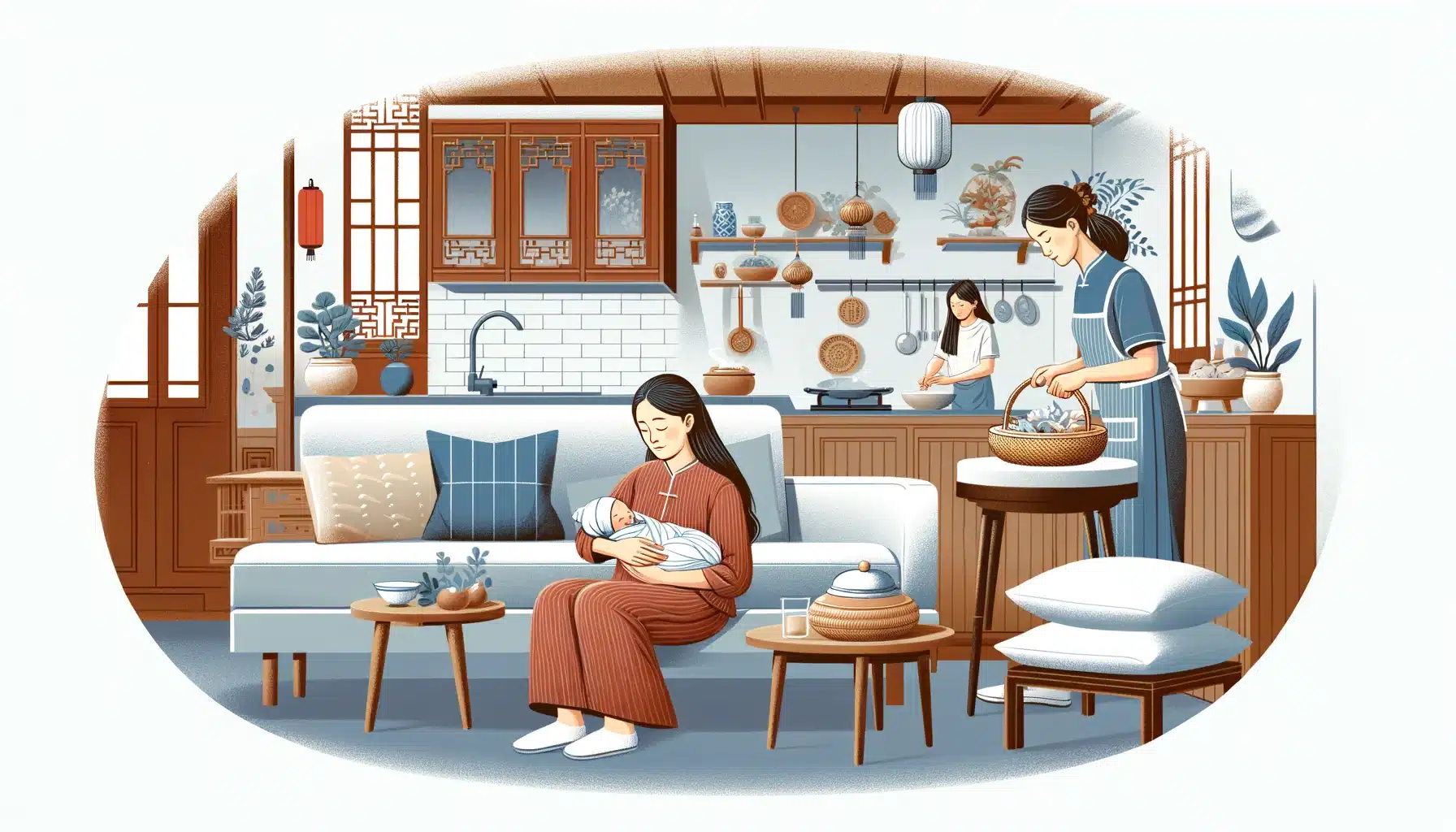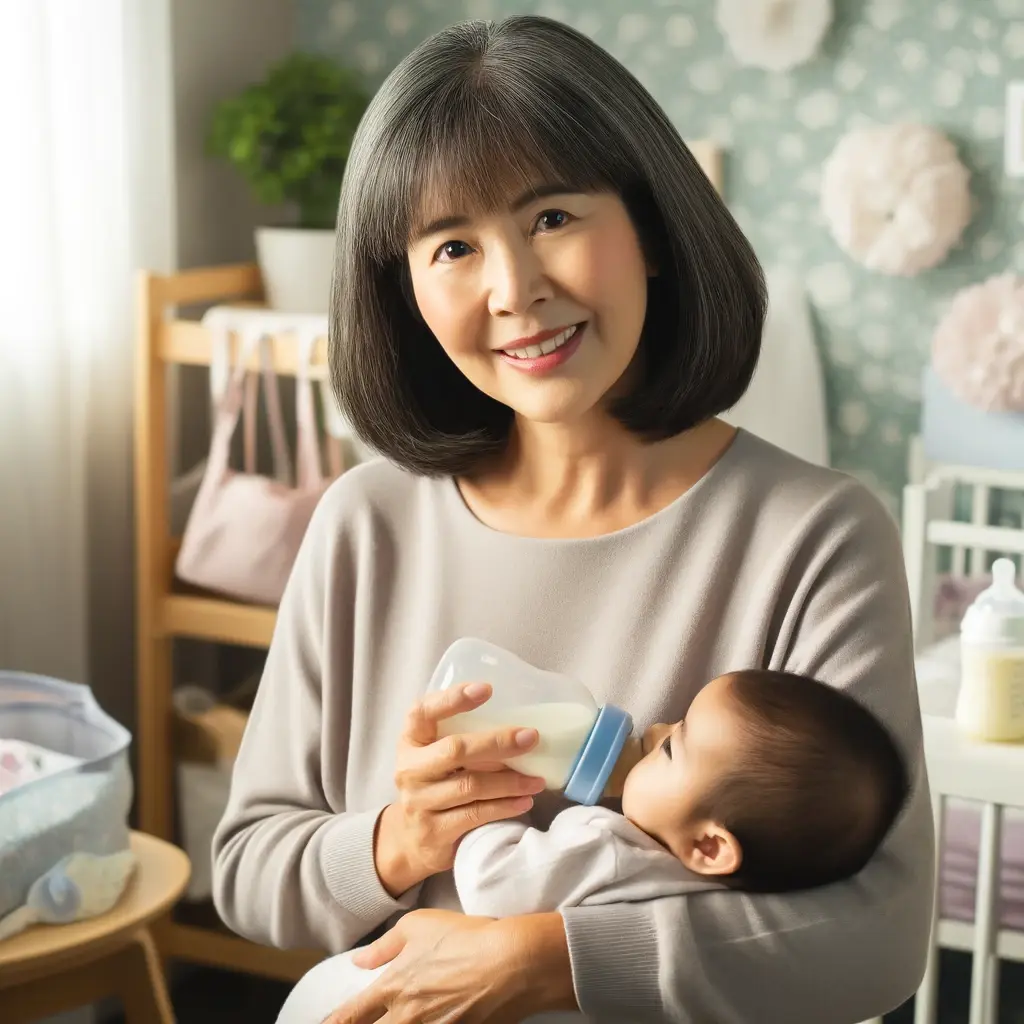Exploring Postpartum Chinese Tradition
Origins and Cultural Significance
The postpartum Chinese tradition, also known as “zuo yue zi” or “sitting the month,” has deep historical roots dating back thousands of years. This practice is centered around the belief that the first month after childbirth is crucial for the mother’s recovery and the newborn’s development. The tradition emphasizes rest, proper nutrition, and specific care routines to ensure the well-being of both mother and baby.
The cultural significance of this tradition is profound. It reflects the values and wisdom passed down through generations, highlighting the importance of family support and holistic care during the postpartum period. The practice encompasses various rituals and dietary customs, aimed at restoring the mother’s body and preventing future health issues. For a detailed understanding of the rules and guidelines, consider reading our article on chinese postpartum rules.
Role of Postpartum Nannies in Chinese Tradition
In the context of modern lifestyles, the role of postpartum nannies, also known as “yue sao,” has become increasingly important. These nannies are trained professionals who specialize in providing care and support during the postpartum period. Their responsibilities include preparing nutritious meals, assisting with breastfeeding, and ensuring that the mother gets adequate rest.
Postpartum nannies play a crucial role in maintaining the integrity of the postpartum tradition. They bring expertise in traditional Chinese medicine, dietary practices, and child care, which can significantly enhance the recovery process for new mothers. Their presence allows the family to adhere to traditional practices while also adapting to contemporary needs.
| Role of Postpartum Nanny | Description |
|---|---|
| Meal Preparation | Cooking nutritious meals based on traditional recipes |
| Breastfeeding Support | Assisting with breastfeeding techniques and issues |
| Rest and Recovery | Ensuring the mother gets sufficient rest |
| Child Care | Helping with newborn care and routines |
| Traditional Practices | Implementing rituals and customs for postpartum care |
For those considering hiring a postpartum nanny, it’s essential to understand their qualifications and training. Explore our article on postpartum nanny for more insights on finding the right professional to support your postpartum journey.
The integration of postpartum nannies into the tradition of “zuo yue zi” ensures that new mothers receive comprehensive care tailored to their cultural and personal needs. This blend of ancient wisdom and modern expertise offers a unique and effective approach to postpartum recovery. Learn more about the benefits and considerations of hiring a confinement nanny to support your postpartum period.
Practices and Beliefs

Dietary Restrictions and Traditional Medicine
In the postpartum Chinese tradition, dietary practices play a crucial role in the recovery process. The focus is on nourishing the body and restoring energy through specific foods and traditional medicine. These dietary restrictions and recommendations are based on ancient wisdom aimed at balancing the body’s energy, or “qi.”
Common dietary practices include:
- Warm Foods: New mothers are encouraged to consume warm foods and beverages to promote blood circulation and prevent “cold” from entering the body.
- Nutrient-Rich Soups: Soups made with ingredients like chicken, fish, and Chinese herbs are believed to enhance milk production and speed up recovery.
- Avoiding Cold Foods: Foods that are cold in nature, such as raw vegetables and cold drinks, are typically avoided to prevent “cold” from affecting the body’s balance.
Common Foods and Their Benefits
| Food Type | Benefits |
|---|---|
| Chicken Soup | Promotes blood circulation |
| Fish Soup | Enhances milk production |
| Red Dates | Boosts energy and blood health |
| Ginger | Warms the body and improves digestion |
Traditional Chinese medicine also plays a role in postpartum care. Herbal remedies and tonics are often prescribed to aid in recovery and improve overall well-being. These remedies are tailored to the individual’s needs and are believed to help restore balance and promote healing.
For more information on the role of dietary practices in postpartum care, visit our article on postpartum care.
Rest and Recovery Period
The rest and recovery period, known as “zuo yue zi” or “sitting the month,” is a fundamental aspect of the postpartum tradition. This period typically lasts for about one month, during which the new mother is encouraged to rest extensively and avoid physical strain.
Key practices during this period include:
- Limited Physical Activity: New mothers are advised to avoid strenuous activities and focus on rest to allow their bodies to heal.
- Avoiding Cold Exposure: To prevent “cold” from affecting the body, new mothers are often kept warm and avoid exposure to cold water and environments.
- Emotional Support: Emotional well-being is emphasized, with family members and a postpartum nanny providing support and care.
Typical Rest and Recovery Activities
| Activity | Purpose |
|---|---|
| Bed Rest | Allows physical healing |
| Warm Baths | Promotes relaxation and warmth |
| Gentle Massages | Improves circulation and relaxation |
| Emotional Support | Enhances mental well-being |
This period is not only about physical recovery but also about bonding with the newborn and adjusting to the new role of motherhood. A postpartum nanny or yue sao often assists with daily tasks, ensuring the new mother can focus on rest and recovery.
To learn more about the significance of the rest and recovery period, visit our article on the postpartum confinement period.
Benefits of Postpartum Chinese Tradition

The postpartum Chinese tradition, often referred to as “zuo yuezi,” offers a range of benefits that support both the physical and emotional well-being of new mothers. This tradition emphasizes rest, recovery, and holistic care during the crucial postpartum period.
Physical Recovery
One of the primary benefits of the postpartum Chinese tradition is its focus on physical recovery. The practices and dietary guidelines are designed to help new mothers regain their strength and health after childbirth.
- Dietary Restrictions and Traditional Medicine: Specially prepared meals rich in nutrients support the body’s healing process. These meals often include ingredients believed to have restorative properties, such as ginger and black chicken. The emphasis on warm foods and beverages helps to replenish energy and promote circulation.
- Rest and Recovery Period: The tradition advocates for a strict rest period, usually lasting for about a month, to allow the mother’s body to recover fully. This period, known as the postpartum confinement period, minimizes physical exertion and provides an environment conducive to healing.
| Aspect | Benefit |
|---|---|
| Diet | Nutrient-rich foods, warm beverages |
| Rest Period | Minimizes exertion, promotes healing |
| Traditional Medicine | Uses restorative ingredients |
Emotional Support and Bonding
The emotional well-being of new mothers is also a key focus of the postpartum Chinese tradition. Emotional support and the fostering of strong bonds between mother and child are integral components.
- Emotional Support: Postpartum nannies, or confinement nannies, play a crucial role in providing emotional support. They offer guidance, reassurance, and practical help, reducing the stress and anxiety that can accompany new motherhood.
- Bonding: The tradition emphasizes the importance of bonding between the mother and the newborn. By ensuring that the mother is well-rested and cared for, she can focus on establishing a strong emotional connection with her baby.
| Aspect | Benefit |
|---|---|
| Emotional Support | Reduces stress and anxiety |
| Bonding | Enhances mother-child connection |
The practices and beliefs of the postpartum Chinese tradition provide a comprehensive approach to postpartum care. By focusing on both physical recovery and emotional support, this tradition offers invaluable benefits to new mothers during the critical postpartum period. For more information on the role of a postpartum nanny and the associated costs, be sure to explore our related articles.
Hiring a Postpartum Nanny

When it comes to navigating the postpartum tradition, hiring a postpartum nanny, often known as a confinement nanny or yue sao, can provide invaluable support. This section will guide you through the qualifications and training of a postpartum nanny, as well as considerations for finding the right one.
Qualifications and Training
A qualified postpartum nanny typically possesses specialized training and experience in postpartum care. Their expertise encompasses various aspects of maternal and infant health, along with knowledge of traditional Chinese confinement practices. Here are some key qualifications and areas of training they often have:
- Certification in Postpartum Care: Many confinement nannies undergo formal training programs that cover topics such as newborn care, maternal recovery, and traditional Chinese postpartum practices.
- Experience with Newborns: Practical experience with newborns is crucial. This includes skills in feeding, diapering, bathing, and soothing infants.
- Knowledge of Traditional Medicine: Understanding dietary restrictions and traditional Chinese medicine practices is essential for providing culturally appropriate care.
- First Aid and CPR Certification: Safety is paramount, and a certified nanny should be equipped to handle emergencies.
| Qualification | Description |
|---|---|
| Certification in Postpartum Care (only in nonwestern countries) | Formal training in maternal and infant care |
| Experience with Newborns | Practical skills in newborn care |
| Knowledge of Traditional Medicine | Understanding of dietary restrictions and traditional practices |
| First Aid and CPR Certification (only in western countries) | Certification in emergency response |
Considerations for Finding the Right Nanny
Finding the right postpartum nanny involves careful consideration of several factors to ensure the best fit for your family’s needs. Here are some important considerations:
- Cultural Compatibility: It’s important to find a nanny who understands and respects your cultural preferences and postpartum traditions. This ensures that the care provided aligns with your expectations.
- References and Reviews: Checking references and reviews from previous clients can provide insights into the nanny’s reliability, professionalism, and ability to handle postpartum tasks.
- Communication Skills: Effective communication is key to a successful relationship with your nanny. Ensure that she can communicate clearly and understands your needs and concerns.
- Availability and Flexibility: Confirm the nanny’s availability and flexibility to meet your schedule and any potential changes. This is especially important during the critical postpartum confinement period.
- Cost Considerations: Understanding the chinese postpartum nanny costs is crucial. Ensure that the nanny’s fees fit within your budget while still providing the necessary care and support. Please also kindly take a look at our Nanny Cost Calculators to see what the current market rates are Today!
| Consideration | Importance |
|---|---|
| Cultural Compatibility | Ensures care aligns with your traditions |
| References and Reviews | Provides insights into reliability and professionalism |
| Communication Skills | Ensures a clear understanding of needs and concerns |
| Availability and Flexibility | Meets your schedule and potential changes |
| Cost Considerations | Fits within your budget |
In conclusion, hiring a postpartum nanny who is well-qualified and aligns with your family’s needs can greatly enhance the postpartum experience. For more information on what to expect during the postpartum confinement period and tips on hiring a confinement nanny, explore our other articles.


